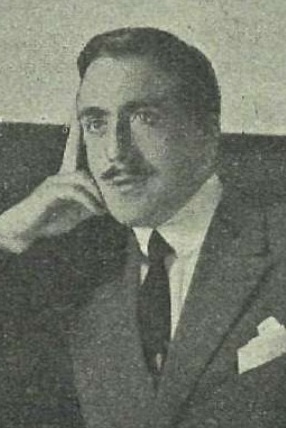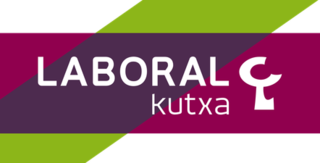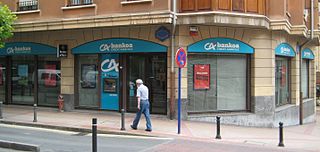
Mondragón, officially known as Arrasate/Mondragón, is a town and municipality in Gipuzkoa Province, Basque Country, Spain. Its population in 2015 was 21,933.

José María Arizmendiarrieta Madariaga was a Basque Catholic priest and promoter of the cooperative companies of the Mondragon Corporation, originally located in the Basque Country and currently spread throughout the world. As of 2021, it is the second largest social economy business group in Spain, bringing together ninety-eight cooperatives, eight foundations, one mutual, ten coverage entities and seven international delegations, distributed in four areas: finance, industry, distribution and knowledge.

The Mondragon Corporation is a corporation and federation of worker cooperatives based in the Basque region of Spain.

Eroski is a Spanish supermarket chain from the Basque Country with nearly 1,000 outlets spread across Spain . It is run as a worker-consumer hybrid co-operative within the Mondragón Corporation group. The establishments vary in size from the largest hypermarkets, simply named 'Eroski', down to smaller 'Eroski Center' stores. There are also 219 'Eroski City' outlets and 234 'Eroski Viajes' travel agent centres. The group's total sales floor space is approximately 1,500,000 square metres (16,145,866 sq ft). The name Eroski is a combination of the Basque words "erosi" and "toki" (place).

The University of the Basque Country is a Spanish public university of the Basque Autonomous Community.

Hernani is a town and municipality located in the province of Gipuzkoa, Basque Autonomous Community, Spain. The town sits on the left bank of the Urumea river. It is located at a distance of 9.2 km from San Sebastián. The municipality of Hernani occupies an area of approximately 40 square kilometres and is bordered by San Sebastián, Astigarraga, Arano, Elduayen, Errenteria, Lasarte-Oria and Urnieta.
The Mondragon Bookstore & Coffeehouse was a political bookstore and vegan cafe located in The Old Market Autonomous Zone at 91 Albert Street in Winnipeg, Manitoba, Canada. The name comes from the Mondragón Cooperative Corporation and other organisations in the Basque town of Mondragón Spain that is known for its extensive network of worker's cooperatives.

Kennametal, Inc. is a manufacturer of high-performance cutting tools and engineered components used in the aerospace, defense, transportation and oil and gas drilling industries. Its customer base is global.

Fagor Electrodoméstico was a large domestic and commercial appliance manufacturer based in the Basque Country, Spain and run by the Mondragon Corporation. Fagor was Spain's largest consumer appliance company and the fifth largest electrical appliance company in Europe, manufacturing a wide range of domestic appliances, including washing machines, refrigerators and ovens.
The history of the cooperative movement concerns the origins and history of cooperatives across the world. Although cooperative arrangements, such as mutual insurance, and principles of cooperation existed long before, the cooperative movement began with the application of cooperative principles to business organization.

The Basque Autonomous Community [ A.C.], also officially called Euskadi [], is an autonomous community in northern Spain. It includes the Basque provinces of Araba, Bizkaia, and Gipuzkoa. It also surrounds an enclave called Treviño.

Okuma Corporation is a machine tool builder based in Ōguchi, Aichi Prefecture, Japan. It has global market share in CNC machine tools such as CNC lathes, machining centers, and turn-mill machining centers. The company also offers FA products and servomotors.

Marcelino Oreja Elósegui (1894–1934) was a Spanish entrepreneur, Catholic activist and Carlist politician.

Laboral Kutxa is a Basque credit union that provides banking, savings and investment services.

The ULMA Group is a business group, made up of nine cooperatives. It group currently has a presence in 81 countries and is one of the largest business groups in northern Spain.

Julen Bollain, Ph.D. in Development Studies, is an economist, professor, and researcher at Mondragon University, specializing in development studies and basic income.

Bankoa is a traditional Spanish bank founded in 1975 and located in San Sebastián.

Rosa María Lavín Ibarra is a Spanish executive and businesswoman. Since 2015, she has been President of the Confederation of Cooperative Companies of the Basque Country, the Basque social economy business organization. She is the first woman to hold this position, and the first woman to lead a business organization in the Basque Country.

José María Ormaetxea Uribeetxebarría was a Basque businessman and cooperativist; one of the five founders in 1956 of Ulgor - later renamed Fagor Electrodomésticos - the first industrial cooperative enterprise of the Mondragon Corporation.

Ferrocarriles Vascongados was a railway company in the Basque Country, Spain; founded in 1906 as the merger of three railway companies. It operated the Bilbao-San Sebastián line, as well as the Elorrio branch and the Deba railway. FEVE took over its operations in 1972, which in 1982 were transferred to the new company Basque Railways. Ferrocarriles Vascongados was dissolved in 1995, after more than two decades without activity.


















